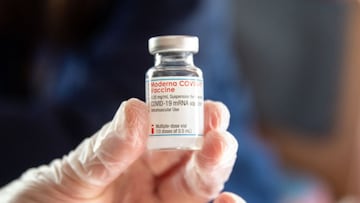How long between Pfizer-BioNTec and Moderna covid-19 vaccines doses?
President Biden is eager to speed up vaccination distribution but most Americans will have to wait weeks between doses of the two-shot pharmaceuticals.


The United States is stepping up the national vaccination effort as states look to hit President Biden’s 1 May target to open up eligibility to all American adults.
On Thursday Florida Gov. Ron DeSantis became the latest local government official to announce that all residents over the age of 18 would be able to get a vaccine. Alaska, Arizona, Georgia and Mississippi have all already opened eligibility to those aged 16 and over.
The vaccine rollout has been one of the fastest in the world with most recipients getting either the Pfizer-BioNTech or Moderna shots. However both of these vaccinations require two doses to reach full efficacy.
How long is the wait between vaccine doses?
Pfizer-BioNTech and Moderna were the first two pharmaceutical companies to get their vaccines approved by the Food and Drug Administration in the United States. They both follow a similar two-step administration approach, but with one slight difference.
Before I took office, I set a big goal of 100 million shots in my first 100 days.
— President Biden (@POTUS) March 25, 2021
We hit the goal on day 58.
Now, I’m setting a new one: 200 million shots in my first 100 days.
Let’s do this.
The Pfizer-BioNTech shot is currently approved for use in those aged 16 and over, and with a two-dose series separated by 21 days.
The Moderna shot is only safe to be given to adults aged 18 and over, and requires a 28-day wait between the two doses.
These timeframes are the official guidance from manufacturers, but the United Kingdom has chosen to extend the delay between doses to as long as 12 weeks in a bid to get the first dose to as many people as possible. It is thought that having a single dose will offer some initial protection, but the scientific community is split on the effect that the extra wait could have on long-term immunity.
Johnson & Johnson provide one-shot solution
In late-February the FDA approved the covid-19 vaccination manufactured by Johnson & Johnson, which is the first one-dose shot to be granted authorisation. The Johnson & Johnson vaccine is less effective than the two-shot alternatives, but is still around 85% effective at preventing severe and critical cases.
Yes, the Johnson & Johnson vaccine has lower reported efficacy than Moderna and Pfizer’s.
— Vox (@voxdotcom) March 23, 2021
But in clinical trials, it was 100% effective at preventing hospitalizations and deaths. And experts say its 66% disease prevention efficacy is still "superb." https://t.co/gENb3MZ6a0 pic.twitter.com/vdrEDMizHN
Related stories
Because it does not require a second shot the distribution and administration of the Johnson & Johnson vaccine should be far easier, but manufacturing issues has stalled the rollout.
Earlier this week the Biden administration said that it had received just 4 million doses of the vaccine, lagging far behind Johnson & Johnson’s own target of 20 million shots by the end of March. This will be of particular concern for the White House who were hoping to use the single-shot vaccine to reach underserved and isolated populations across the country.

